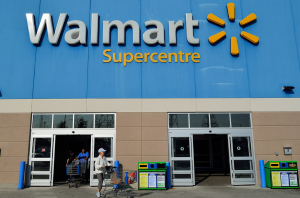By Majority Action
Photos: YouTube Screenshot\Wikimedia Commons
WASHINGTON – Today, Majority Action filed a communication to shareholders with the Securities and Exchange Commission (SEC) calling on Walmart shareholders to vote for a racial equity audit proposal (Item 5 on Walmart’s proxy statement) to analyze the company’s adverse impacts on Black, Indigenous and People of Color (BIPOC) workers and communities and recommend ways to improve the company’s racial equity impact. Majority Action is also recommending investors support shareholder proposals for a human rights impact assessment (Item 6), living wage for workers (Item 7) and workplace safety and violence review (Item 9).

“Walmart executives say they’re doing all these things to address racial inequity and safety on the job, and because there are various initiatives that are supposedly available to workers, they don’t think the company needs the independent racial equity audit we’re calling for. But in my thirty-plus years at Walmart, I haven’t seen any racial equity or health and safety initiatives from the top,” said Daniel Coles, a leader with United for Respect and Associate at the Walmart Supercenter in Paramount, Calif., who has been with the company for 31 years. “Walmart needs to listen to its employees — we’re the ones who understand what’s really going on inside our stores. We are the heartbeat of this company and we deserve respect.”
Majority Action’s exempt solicitation reads: “Support for Item 5 (Racial Equity Audit) on Walmart’s 2024 proxy is warranted for the reasons below:
-
The company is involved in numerous controversies concerning racial discrimination and bias, disproportionately harms workers of color through its human capital management practices, and underinvests and underperforms in low-income communities of color.
-
A racial equity audit would allow Walmart—a company that relies heavily on Black and Brown frontline workers to generate value—to better manage its human capital risks.
-
A racial equity audit would help Walmart deliver on a growth strategy that leverages the U.S.’s shifting racial and ethnic demographics.
-
As the nation’s largest private employer, grocer, and retailer, Walmart’s policies and practices have far-reaching racial equity impacts, including in upstream and adjacent low-wage sectors. Given Walmart’s outsized influence, a successful audit could mitigate economy-wide racial equity risks within and across industries.”
“Walmart is the largest private employer of Black workers in the country, with over 50 percent of its hourly workforce identifying as persons of color. Its strategies, practices, and policies have an outsized impact on workers and consumers of color,” said Whitney Shepard, Manager of Stakeholder Engagement at Majority Action. “While Walmart’s DEI initiatives may be well-intentioned, a racial equity audit is needed to determine whether these initiatives are actually addressing workers’ needs, achieving their intended objectives, and being fairly and consistently implemented across the company’s over 4,500 U.S. stores.”

During a May Day webinar, Walmart workers presented a petition for their fellow associates to sign calling on Walmart board members, elected public officials and shareholders to address workplace safety and racial inequity at Walmart through conducting independent third-party audits to address these issues.
Shareholders filed a similar proposal last year asking the company to conduct a racial equity audit analyzing its adverse impacts on BIPOC communities. ISS and Glass Lewis both supported the proposal, but State Street was the only one of the Big Four asset managers to support it. The proposal received support from 18.2 percent of shares voted by all shareholders and 42 percent of shares voted by non-Walton family shareholders. The Waltons, who are the richest family in America, own approximately 50 percent of Walmart shares.
“The largest asset managers pulled back on support for racial equity audit proposals in 2023. Amidst rising racial inequality and the wide-ranging attacks on racial progress, it is critical that the largest asset managers act as responsible stewards of capital and hold the nation’s largest company accountable to inclusive and equitable value creation,” Shepard added.
An investigation by the House Select Subcommittee on the Coronavirus Crisis found that “Walmart had some of the largest racial inequities of the surveyed companies when it came to employment outcomes,” with Black hourly workers fired twice as frequently as white hourly workers in 2020. A Government Accountability Office report found that Walmart’s wages are so low that its workers are the biggest recipients of Medicaid and SNAP benefits in most states.
In addition, frontline Walmart employees have raised serious concerns about and continue to experience myriad workplace safety issues, including unsafely stacked products, organized theft, and threats of physical assault and/or gun violence from customers and co-workers. In April of this year, Walmart was named by the National Council for Occupational Safety and Health, a nationwide network of non-profit worker safety advocates, as a Dirty Dozen employer for 2024. Research shows that BIPOC workers experience higher rates of work-related injuries, diseases, and psychological distress than white workers.

Majority Action is a nonprofit organization dedicated to empowering shareholders of all sizes to hold corporations and their leadership accountable to high standards of long-term value creation, corporate governance, and social responsibility. www.majorityaction.us








